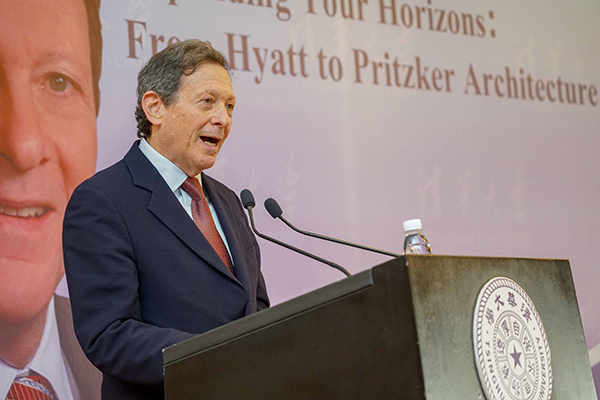Building up


But Pritzker's association with China is much older than the program at Tsinghua. In the past two decades, he has done research on the preservation of cultural relics in China by partnering with such institutions as the National Cultural Heritage Administration and Sichuan University in Chengdu.
He paid his first visit to China in July 1976 for his family business-Hyatt hotels-just two days after the Tangshan earthquake in the country's north.
Subsequently, economic changes in China attracted him to visit regularly. It was like reading a book and wanting to know the next chapter, he says.
Other than archeology, he has long been interested in Himalayan art, which focuses on Buddhist artworks in parts of Asia, including Sichuan province and the Tibet autonomous region in China.
Pritzker says that, during his early travels to the mountainous areas in China in the 1970s and '80s, he saw some murals in caves that were in need of protection. But back then, people didn't have the awareness about how important the artworks were. So, he developed a program to train locals to protect the murals. The training not only gave rural residents ideas about how to preserve such old artworks but also increased awareness of the national treasures.
At the age of 12, Pritzker says, he pointed to the world map hanging over his bed and told his friend that he would travel in the Himalayan area, including parts of China, in the future.
When he grew up, he did travel to the mountains in China, some of which stand at 4,500 meters above sea level, to research Himalayan art and archeology at cultural sites-interests that he says are very different from his daily job as the executive chairman of Hyatt Hotels Corp, among other responsibilities.
Just a week before his speech to architecture students at Tsinghua last month, he and his family went to places along the ancient Silk Road, such as Tajikistan, and China's Xinjiang Uygur autonomous region and Gansu province. The old route is a new field for Pritzker to learn and study, he says.
He is curious about new things, and his interests lead him to meet different groups of people. These exchanges help his career as a hotelier as well, he adds.
Pritzker encouraged students at Tsinghua during his speech to navigate the unknown with two tools: curiosity and architecture as a problem-solving approach.
He uses these in his own career and life, he says.
Contact the writer at dengzhangyu@chinadaily.com.cn




































